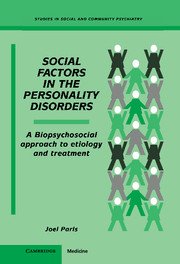Book contents
- Frontmatter
- Contents
- Foreword
- Introduction
- Acknowledgments
- 1 Overview
- 2 Personality Traits and Personality Disorders
- 3 Biological Factors
- 4 Psychological Factors
- 5 Social Factors – Methods
- 6 Social Factors – Mechanisms
- 7 A Biopsychosocial Model of the Personality Disorders
- 8 The Odd Cluster
- 9 The Impulsive Cluster
- 10 The Anxious Cluster
- 11 Treatment
- 12 Clinical Practice
- Epilogue: Summary and Research Implications
- References
- Index
11 - Treatment
Published online by Cambridge University Press: 05 May 2010
- Frontmatter
- Contents
- Foreword
- Introduction
- Acknowledgments
- 1 Overview
- 2 Personality Traits and Personality Disorders
- 3 Biological Factors
- 4 Psychological Factors
- 5 Social Factors – Methods
- 6 Social Factors – Mechanisms
- 7 A Biopsychosocial Model of the Personality Disorders
- 8 The Odd Cluster
- 9 The Impulsive Cluster
- 10 The Anxious Cluster
- 11 Treatment
- 12 Clinical Practice
- Epilogue: Summary and Research Implications
- References
- Index
Summary
This chapter will evaluate present methods of treatment for patients with personality disorders. First we will examine the outcome of these disorders, since any claims for successful treatment must be measured against their natural course. Second, we will consider what empirical research can tell us about the effectiveness, or the ineffectiveness, of the most common modalities of therapy. Third, we will attempt to determine which patients are most likely to benefit from treatment. Finally, we will describe certain pitfalls in the therapy of personality disordered patients.
Outcome of the personality disorders
We cannot fully understand the effects of treatment in psychiatric disorders unless we know their outcome. Chronic disorders remit only slowly over time. A gradual improvement in the course of treatment may therefore only reflect natural history.
Personality disorders are, by definition, chronic. We need to examine the empirical literature as to their outcome. But before doing so, we must address three methodological problems. First, outcome research in North America prior to 1980 suffered from an absence of well-defined criteria for diagnosis. Second, not all studies assess patients from multiple points of view; to be comprehensive, research needs to take into account symptoms, levels of functioning in different sectors, as well as whether the criteria for the original personality disorder diagnosis are still present. Third, many outcome studies have been relatively short term (<5 years), while fewer have been truly long term (≥15).
- Type
- Chapter
- Information
- Social Factors in the Personality DisordersA Biopsychosocial Approach to Etiology and Treatment, pp. 144 - 160Publisher: Cambridge University PressPrint publication year: 1996

